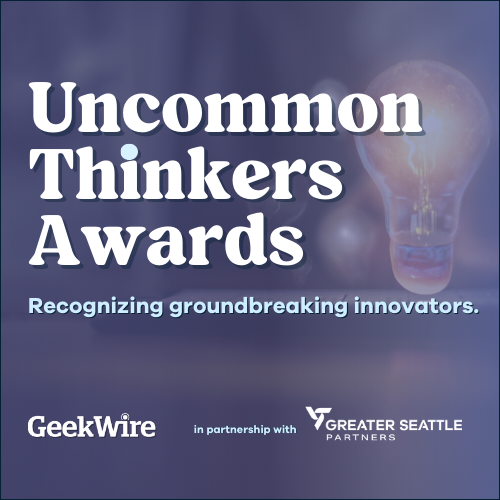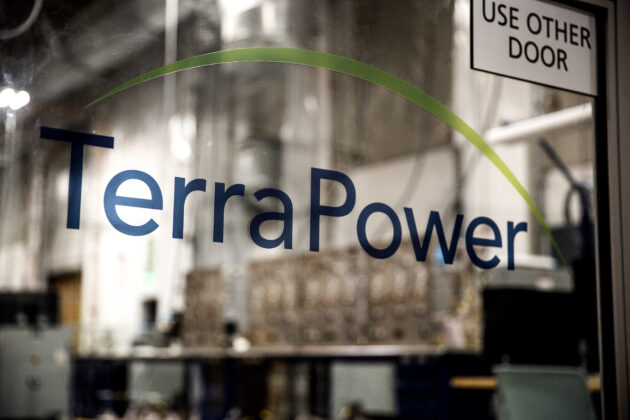
06 12, 2024
Microsoft releases preview of voice-enabled ‘Copilot Vision’ AI browsing companion for Edge
A new opt-in Microsoft Edge feature, released in limited preview today, augments the browsing experi...
Read More

06 Dec, 2024
Editor’s note: This series profiles five of the Seattle region’s “Uncommon Thinkers”: inventors, scientists, technologists and entrepreneurs transforming industries and driving positive change in the world. They will be recognized Dec. 12 at the GeekWire Gala. Uncommon Thinkers is presented in partnership with Greater Seattle Partners.
Chris Dunckley is helping lead a daunting task.
It starts with decaying U.S. weapons waste from the Cold War era, material so radioactive that it can only be handled remotely. The waste component that he and his team at TerraPower Isotopes are using is so rare that their supply of it weighs the equivalent of 17 U.S. pennies.
The startup is using the waste to extract a radioisotope called actinium-225 that’s being tested as a highly anticipated and promising medical therapy, turning war ammunitions into a tool for fighting cancer.
Dunckley, TerraPower Isotopes’ director of chemistry and engineering, is orchestrating a multidisciplinary team that includes health physicists, mechanical engineers, radiochemists and others to get the job done. He’s tapping into a suite of scientific and leadership skills that have been honed over his career.

“The level of complexity and number of engineering disciplines that need to connect together to get the job done here is much more significant than any anywhere I’ve worked before,” Dunckley said.
Scott Claunch, president of Everett, Wash.-based TerraPower Isotopes, draws on a long list of adjectives to try and capture Dunckley’s recipe for success.
“He’s inclusive and optimistic and humble [so] he’s able to assess ideas, opportunities with a sense of clarity that maybe others don’t have,” Claunch said. “He’s got a very disciplined process for making decisions, very evidence based, very scientific,” he added. “All of that together just makes him the ‘uncommon thinker.'”
TerraPower Isotopes, a subsidiary of the next-generation nuclear power company TerraPower, recently hit a significant milestone. In October, the startup announced that it was the first commercial-scale producer of actinium-225.
Thanks to the processes developed by Dunckley and others, TerraPower Isotopes should be able to purify enough of the material for up to 400,000 doses of cancer therapies every year, for many years to come.
“We’re able to produce the actinium,” Dunckley said, “and really make a difference in people’s lives.”

Dunckley’s journey to a game-changing, Bill Gates-backed nuclear enterprise in Washington state started in the United Kingdom at age 16.
In the UK’s educational system, high school students must pick an area of specialty, and he chose chemical engineering. That led to a doctorate in his field from the University of Cambridge, and later a master’s in management science and engineering from Stanford.
In academia, Dunckley took a deep dive into research that included creating beautiful images revealing the flow of liquids and gases over particles. It opened his eyes to life’s complexities.
“You might have these individual models of how something would work in math and on paper, but the physical world is really complicated, so being able to visualize that I found really interesting,” he said. “And think it’s kind of been part of everything I’ve done since then.”
But Dunckley was eager move beyond the academic setting to apply his skills to impactful, real-world challenges.
He was concerned about climate change and accepted a role at Chevron — a somewhat counterintuitive choice. But at the time, the company was engaged in research on renewable fuels and the job taught Dunckley a valuable lesson in how to take bench-scale chemistry and massively ramp it up. It’s particularly tricky to do in chemistry as the behavior of the elements and processes change when the scale gets larger.
Dunckley left Chevron after three years as the fossil fuel giant began putting less emphasis on his area of work in alternative fuels.
Still eager to address climate issues, Dunckley took a job at Rennovia, a California startup taking corn sugars from sugar mills and using them to make materials such as nylon, which is normally produced from petroleum.
At Rennovia, Dunckley learned how to build and manage a research team while creating a positive, productive culture. The founders were also smart about defining their business model from the outset of their work, he said.
“I would say that’s the company that shaped me the most in terms of how to work,” Dunckley said. “The founders were just really special people.”
A drop in oil prices, however, hit exactly when the startup was seeking investors. It didn’t get the needed funding and the company folded.
Dunckley was briefly at a nuclear power company, and then made the move to Washington. He took a role at Arzeda, a protein design startup that spun out of research done by David Baker, the University of Washington professor who recently won a Nobel Prize in chemistry.
Arzeda uses artificial intelligence to create new proteins. Dunckley said he learned how to navigate through long iteration cycles by predicting what would come next.
“It’s almost like looking at chess five steps ahead and thinking through what was going to happen,” he said.
From that experience he realized that even when you don’t have the full knowledge of the technical problem you’re tackling, “you can look many steps down the road at the different possibilities and already take actions to try to accelerate your process development,” Dunckley said. “So that’s a cool thing.”

TerraPower Isotopes’ modern-day take on turning swords into plowshares — or nuclear waste into cancer therapies — was an inspiring draw for Dunckley.
“It’s a really compelling story that I wanted to be involved in,” he said. “And then at the same time, it’s part of this broader company that’s, I think, going to make a huge difference addressing climate change, and is super committed to all those aspects of climate change and human health.”
It was an opportunity that allowed him to bring together and execute on all of his experiences — scaling a process, building and leading teams, thinking ahead to speed development — and have a positive impact.
Scientists almost a decade ago did initial tests showing that actinium-225 containing therapies could treat prostate cancer that resisted other treatments.
The strategy is part of a broader field of cancer care using antibodies that recognize cancerous cells and bind to them while carrying isotopes or chemical poisons that destroy the diseased cell. Actinium-225 can be that payload, creating a radiopharmaceutical that kills the target cells.
Actinium-225 has potential uses in therapies for all of the solid tumor cancers, including breast, colon, liver and others. Drug developers are testing their treatments in Phase 1, Phase 2 and Phase 3 trials, working toward approval by the U.S. Food and Drug Administration.
While Dunckley has played a key part in TerraPower Isotopes’ efforts, he emphasizes the essential importance of working as a team.
“When it comes to complicated problems,” he said, “it’s teams that solve those problems, less than individuals. Embracing that teamwork, how to brainstorm together, how to collaborate…. that’s what’s behind solving complicated problems.”